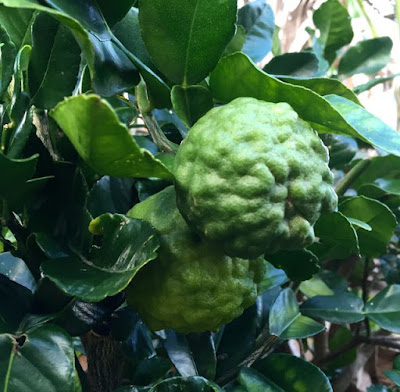Ubud, Bali, on the road to Kaliki
I have spent many happy and fascinating times in Indonesia and am a big fan of it's little known cuisine (how many Indonesian restaurants do you have in your town?) - this is one such dish. If you like Indian curries, you will be surprised at the freshness and pungency of this dish by comparison - give yourself, and your taste buds a treat and try it.
This photo shows three members of the ginger family which I have just harvested and use fresh in this recipe - common ginger, galangal and turmeric. Fresh ingredients, if you can get them, are always going to give a superior flavour to dried.
Freshly prepared spice paste
Recipe1 brown onion
5 cloves garlic
4 large red chillies (this is a matter of taste so adjust to yours)
Extra small, birds eye chillies if you like it really hot.
1 tbsp chopped fresh ginger
2 tbsp chopped fresh, or dried, galangal
NOTE: A traditional Balinese recipe would also call for lesser galangal kaempfera galanga, but I have never been able to buy it in Australia except in a stale old powdered form, so I leave it out. Meanwhile, I'm hunting for a plant to grow in the garden.
1 tbsp chopped fresh, or dried, turmeric
1 tbsp fresh coriander roots (or stems if unavailable)
1 tbsp tamarind pulp
Zest of 2 limes (substitute makrut/kaffir limes if you have them)
1/2 tsp shrimp paste (leave out if vegan)
1/3 cup toasted raw cashew nuts
NOTE: In Bali they would use candlenuts, but I find that the ones you can get in Australia are old and rancid so cashews or macadamias are the best option. They are used to thicken the paste and make it more creamy
1 tsp black peppercorns
2 tsp coriander seeds
1 tsp cumin seeds
1/4 tsp ground nutmeg
1 tbsp palm sugar
2 tbsp coconut or peanut oil
An old travel diary from Bali and my attempts to work out the botanical names of the the spice mix after a cooking class in Ubud.
Method1. Apart from the oil, process all of the ingredients in a food processor until a thick paste is formed - you may want to add a little of the oil to combine it.
TOP TIP: After you have combined all the ingredients, leave them in the food processor for about 20 minutes to soften and then re-process - you will get a finer paste this way.
2. Heat the remaining oil in a wok and fry the spices over a medium flame, stirring constantly, for 2-3 minutes until the mix is glossy and golden.
NOTE: When this has cooled it can be stored in clean jars in the fridge with a little oil on top until ready for use.
Makrut Lime Citrus hystrix (old Kaffir Lime) using the zest of the fruit and leaves in this dish
Chicken Curry Balinese Style
750g free range chicken pieces
3 tbsp coconut or peanut oil
4 makrut/kaffir lime leaves
2 stalks lemon grass, bruised
1 cup water
1 cup coconut cream
Sea salt to taste
Fresh lime and coriander leaves for serving
2. Heat the oil in a wok and throw in the chicken pieces and stir around for a couple of minutes.
3. Add 2 tbsp of the curry paste and stir around to coat the chicken. Throw in the lime leaves and bruised stalks of lemon grass.
4. Add the water and cook uncovered until the chicken is tender and the water is reduced by half.
5. Add salt to taste.
6. Add the coconut cream and briefly bring to the boil just before serving. Serve with rice.
NOTE: Potatoes, beans or carrots may be added and tofu or tempe served instead of
meat.
Balinese Chicken Curry
"Whosoever offers to me with devotion a leaf, a flower, a fruit or water - that offering of love, of the purest heart I accept"
Mahabharata (sacred Hindu text)
"Whosoever offers to me with devotion a leaf, a flower, a fruit or water - that offering of love, of the purest heart I accept"
Mahabharata (sacred Hindu text)








No comments:
Post a Comment